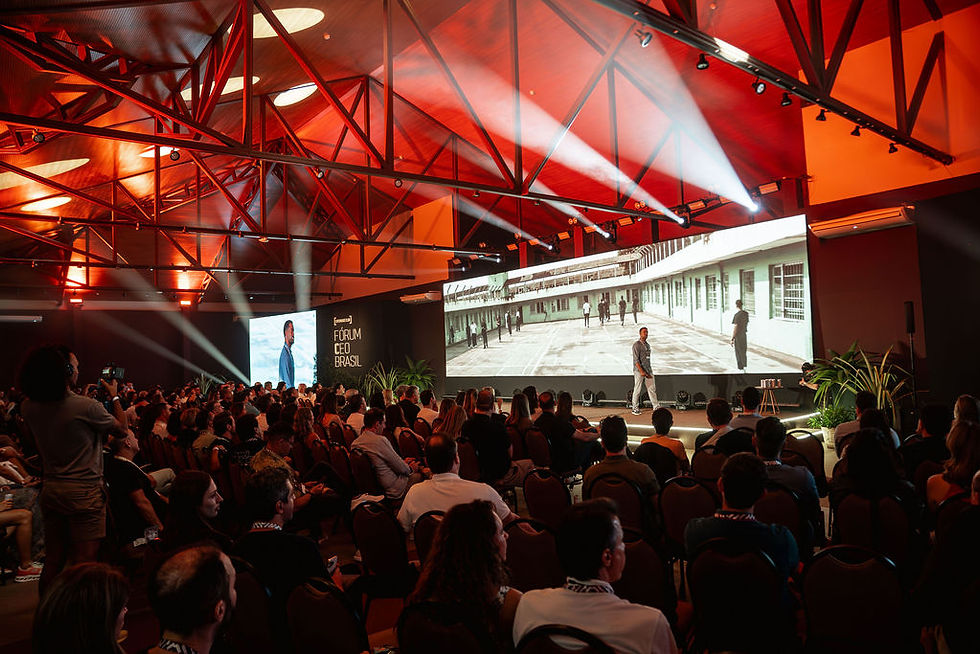[CEO Brazil Forum 2025] The Future in Focus: Blockchain, Healthy Eating, and the Silver Economy
- Editorial Team
- Sep 22, 2025
- 3 min read

Márlyson Silva (Transfero), Andrea Bisker (Spark:Off), and Rodrigo Barros (Boali) Close Day 3 of the CEO Brazil Forum 2025
By Monica Miglio Pedrosa, Experience Club Brazil
Rodrigo Barros’ entrepreneurial journey is rooted in a family motto: “The bar only feeds one family.” Growing up between Portugal and Brazil, Rodrigo worked his way up from farm jobs to running a small bar he bought with no upfront capital, paying it off through hard work. His father followed a similar path, becoming a lawyer and real estate entrepreneur — shaping Rodrigo’s belief that each generation must build its own future.
Rodrigo pursued a career in sports, playing soccer professionally until an injury ended his run. Just two days after returning to Brazil, he pivoted into fitness management — and quickly discovered how sponsorship could become a revenue driver. A single weekend tournament he organized led to three car sales and a lucrative monthly sponsorship deal worth R$600,000 within just three months.
Rather than accept 20% equity in the gym business, Rodrigo chose to build ventures of his own, focusing on synergies and scalable models. After a stint at Stanford learning design thinking, he shifted his mindset from business-obsessed to product-obsessed.
Healthy eating became his next frontier. First as an advisor to Salad Creations — then acquiring the chain in 2015 — Rodrigo founded Boali, now Brazil’s largest healthy fast-casual brand with 170 franchise locations. Following the recent acquisition of Mana Poke, Boali now serves over 400,000 customers monthly and impacts 2,000 families directly. With operations in Lisbon, Miami, and soon Barcelona (2026), Boali is going global — proving that a business can “feed much more than one family.”
From Code to Blockchain Infrastructure
Márlyson Silva’s story starts with curiosity and discipline — values instilled by his Navy father and artisan mother. He taught himself programming as a teenager and quickly discovered that his comfort zone was “a place with air conditioning, hot coffee, and a computer.”
His career took him to Sirius, BRQ, and maxiPago, where he helped localize a U.S. financial software solution that was later acquired. That experience showed him how money moves globally — and inspired him to build something beyond code.
In 2015, Márlyson launched Bit.One, a crypto payment gateway that became
Bradesco’s blockchain lab. As Brazil had no regulatory framework at the time, he moved to Switzerland and transformed the company into Transfero — a blockchain-based financial solutions provider. Transfero enables companies across Latin America to offer banking, payments, and crypto services. Its flagship product, BRZ, facilitates cross-border transfers between Brazil, Asia, and Europe.
Beyond technology, Márlyson created Transfero Academy to train young talent from underserved communities through an intensive six-month program. “Discipline is critical,” he said, reflecting on the next generation’s expectations. His closing message was a reminder that career success should never eclipse life’s essentials: “Sometimes we focus so much on work that we forget to be human and share big moments with family.”

The Rise of the Silver Economy
By 2030, Brazil will rank sixth in the world for its mature population. The number of people aged 65+ has grown 57% in the past 12 years, and 63% of those 60+ are family providers.
Andrea Bisker, CEO of Spark:Off, highlighted during the closing keynote that this 60+ demographic already moves R$2 trillion annually — a figure projected to reach R$3.8 trillion and 35% of total consumption by 2044. Yet 63% of businesses still target Millennials as their primary audience, signaling a massive opportunity gap.
Bisker pointed to longevity as a growth market spanning housing (e.g., NAARA Longevity Residences, Vitacon Senior Living), mobility tech (including exoskeletons), and health innovations (apps for medication management and even LG’s AI-enabled AC units for women in menopause).
She stressed that companies must include mature professionals on their teams to design relevant products and services. “Aging is not about losing relevance — it’s about starting new cycles,” she said. “Curiosity is the first thing you lose when you truly get old.”
Studies show that healthy aging depends 20% on genetics, 30% on environment, and 50% on free will — which makes her final message especially clear: “Take care of tomorrow’s version of yourself — starting today.”

![[CEO Brazil Forum] Angelo Canuto: From Prisoner to Entrepreneur and Sports Talent Manager](https://static.wixstatic.com/media/5cba49_2167da1af91747ad908bf83153408adc~mv2.jpg/v1/fill/w_900,h_610,al_c,q_85,enc_avif,quality_auto/5cba49_2167da1af91747ad908bf83153408adc~mv2.jpg)


Comments